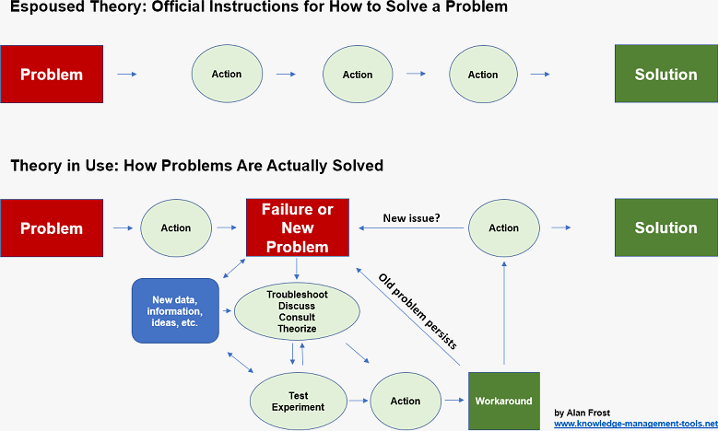Two of the most noteworthy contributors to the field of organizational learning theory have been Chris Argrys and Donald Schon. Organizational learning (OL), according to Argrys & Schon is a product of organizational inquiry. This means that whenever expected outcome differs from actual outcome, an individual (or group) will engage in inquiry to understand and, if necessary, solve this inconsistency. In the process of organizational inquiry, the individual will interact with other members of the organization and learning will take place. Learning is therefore a direct product of this interaction.
Argrys and Schon emphasize that this interaction often goes well beyond defined organizational rules and procedures. Their approach to organizational learning theory is based on the understanding of two (often conflicting) modes of operation:

Espoused theory: This refers to the formalized part of the organization. Every firm will tend to have various instructions regarding the way employees should conduct themselves in order to carry out their jobs (e.g. problem solving). These instructions are often specific and narrow in focus, confining the individual to a set path. An example of espoused theory might be "if the computer does not work, try rebooting it and then contact the IT department."
Theory-in-use: This is the actual way things are done. Individuals will rarely follow espoused theory and will rely on interaction and brainstorming to solve a problem. Theory in use refers to the loose, flowing, and social way that employees solve problems and learn. An example of this might be the way someone actually solves a problem with their computer by troubleshooting solutions, researching on forums, asking co-workers for opinions, etc.
The fact that there is a mismatch between these two approaches is potentially problematic if the company enforces its espoused theory. In order to create an environment conducive to learning, firms are encouraged to accept theory in use, and make it easy for the individual to interact with his working environment in an undefined and unstructured way. Essentially they should provide the right environment for organizational inquiry to take place, unconstrained by formal procedures.
Levitt and March (1996) expand further on the dynamics of organizational learning theory. Their view presents the organization as routine-based, history dependent, and target oriented. While lessons from history are stored in the organizational memory, the event itself is often lost. They note that past lessons are captured by routines "in a way that makes the lessons, but not the history, accessible to organizations and organizational members." The problem most organizations face is that it is usually better to have the event rather than the interpretation. However this is often too costly (both financially and time-wise) to be feasible.
OL is transmitted through socialization, education, imitation and so on, and can change over time as a result of interpretations of history.
Organizational Learning Theory: The Three Types of Learning
Argrys and Schon (1996) identify three levels of learning which may be present in the organization:

- Single loop learning: Consists of one feedback loop when strategy is modified in response to an unexpected result (error correction). E.g. when sales are down, marketing managers inquire into the cause, and tweak the strategy to try to bring sales back on track.
- Double loop learning: Learning that results in a change in theory-in-use. The values, strategies, and assumptions that govern action are changed to create a more efficient environment. In the above example, managers might rethink the entire marketing or sales process so that there will be no (or fewer) such fluctuations in the future.
- Deuterolearning: Learning about improving the learning system itself. This is composed of structural and behavioral components which determine how learning takes place. Essentially deuterolearning is therefore "learning how to learn."
This can be closely linked to Senge's concept of the learning organization, particularly in regards to improving learning processes and understanding/modifying mental models.
Effective learning must therefore include all three, continuously improving the organization at all levels. However, while any organization will employ single loop learning, double loop and particularly deuterolearning are a far greater challenge.
Conclusion
From organizational learning theory we can infer the following issues which may affect knowledge management and knowledge management systems:
- OL is dependent on allowing organizational inquiry to take place according to theory-in-use, not espoused theory.
- OL is a complex mechanism, resulting often in the storage of interpretations of past events, rather than the events themselves.
- OL can take place on three different levels. While single loop learning comes natural to any individual/organization, special attention must be paid to the double-loop and deuterolearning.
 Emil Hajric
Emil Hajric